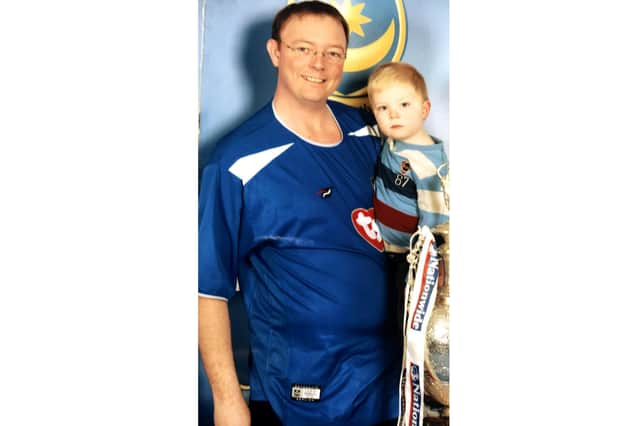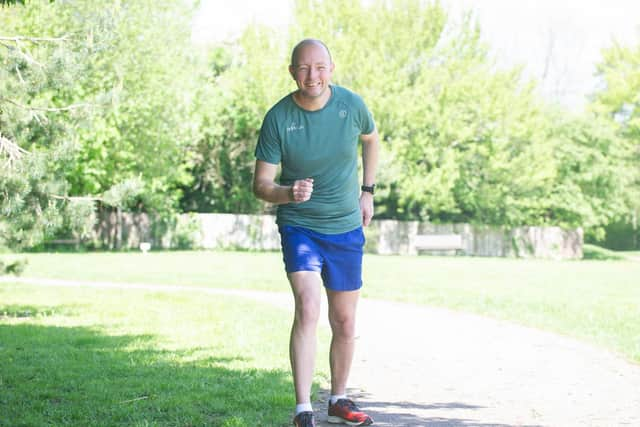This Horndean man went from health wreck to NHS mentor – Big Read


Weight and diet wasn’t something he worried about when he was in his 20s. But when he reached 30 and started to pile on the pounds, Mark became increasingly concerned.
Mark, from Horndean, says: ‘I felt myself getting heavier and feeling more tired. The foods I was eating weren’t particularly good.
Advertisement
Hide AdAdvertisement
Hide Ad‘At around the same time, I had left my job as a financial advisor at Lloyd’s bank and started my own business. When you’re self-employed, you’re often working long days, late nights and dashing around. Eating well wasn’t high on my priority list.


‘Then the financial crash hit which put more stress and strain on me because it was not a good time for my industry.’
It wasn’t until Mark, 50, tried to get life insurance that his unhealthy lifestyle was brought to the fore.
He says: ‘As part of the insurance policy, they sent a nurse round to see me. She said my blood sugars were slightly high and it might be worth going to the GP.
Advertisement
Hide AdAdvertisement
Hide Ad‘Like a lot of people, I googled a lot of my symptoms that night and convinced myself I had type 2 diabetes.
‘I kept on having an itchy foot at night but didn’t think anything of it. It turned out it was a symptom.’
At 39, Mark was diagnosed but it still came as quite a shock. The average age of diagnosis in the UK stands at 45 and it is not uncommon, with more than nine out of 10 people with diabetes having type 2. It was previously called ‘adult-onset diabetes’ because it was rarely diagnosed in children.
Mark explains: ‘The doctors arranged a nurse to help me with a diet plan and we went through the NHS Eat Well plate together.
‘I was around 16 stone and knew my body wasn’t coping.
Advertisement
Hide AdAdvertisement
Hide Ad‘At 39, I was worried because I didn’t ever think I would have this condition and especially at an early age. You start thinking about your future and retirement and I didn’t want it filled with hospital appointments and medication.
‘The NHS was very helpful and a lot of the diet made sense. It was made up of low fat foods and starchy carbohydrates, such as brown rice and brown bread.
‘I knew it was a progressive, chronic illness but I had a plan.’
Like most type 2 diabetes patients, Mark was prescribed metamorphin – a drug which lowers your blood sugar levels by improving the way your body handles insulin.
Advertisement
Hide AdAdvertisement
Hide Ad‘I was always told to do the best I could without much medication but they said as time went on, it would increase,’ says Mark.
‘I started really getting into fitness, doing more than the 150-minutes exercise prescribed each week.
‘I thought I was turning my life around. My blood sugars slowly started to drop and the levels improved.’
Mark was on a health high, feeling happy and confident in his ability to control his condition with diet and exercise. For him, using more medication would always be a last resort. He says: ‘However, as time went by they slowly started to creep up again.
Advertisement
Hide AdAdvertisement
Hide Ad‘In 2016, they were going to increase my medication. I didn’t know what to do and knew I couldn’t do any more. I was following all the guidance and experts but my condition was getting worse again.
‘The doctors said they did tell me it was progressive and no one was ever in remission of type 2.
‘I just wanted to be able to do something about it. They told me I was never going to get off this ride and once you became diabetic, that’s it.’
Mark slowly came to terms with this until he came across Jeremy Vine talking to a doctor about type 2 diabetes on BBC Radio 2.
Advertisement
Hide AdAdvertisement
Hide Ad‘Jeremy was talking with Dr Michael Mosley, who was saying we may have the treatment for type 2 diabetes all wrong and that our understanding is not as clear as we once thought.
‘He said that starchy carbohydrates may not be the best because they are harder to break down. Those with type 2 have a slower metabolic rate and have a real problem metabolising carbohydrates. Therefore it puts the body under more pressure. He said it wasn’t helping people improve.
‘There were other studies which suggested type 2 could be reversed with real foods such as lowering carbohydrates, avoiding processed foods and increasing healthy fats, such as butter and cheese.’
Within one week of changing his diet, Mark’s blood sugar levels returned to normal and he was taken off medication. He says: ‘In that one week, I also lost nine pounds and two months later, I was a stone and a half down. My blood sugar levels have been normal ever since.
Advertisement
Hide AdAdvertisement
Hide Ad‘That’s when I decided I wanted to help others as much as possible.’
In the past few years, Mark has dedicated much of his time to spreading the word about the diabetes diet which worked for him.
‘In 2017, I was invited on to Radio Solent to talk about my story. Then in 2018, I was invited to parliament to speak alongside professors and doctors who had found evidence for diet reversing diabetes. Dr David Unwin, a GP in the north of England, wanted me to explain it from my point of view and how much better I felt.
‘David Unwin has seen his GP surgery cut medication costs by over £50,000 per annum. Just imagine the cost saving if all surgeries were helping their patients this way.
Advertisement
Hide AdAdvertisement
Hide Ad‘Since then I have been invited to NHS conferences and Michael Moseley invited me on stage when he gave his talk in Portsmouth.’
In 2019, the local NHS diabetes team headed by Sue Craddock invited Mark to help them and establish a diet programme.
‘We came up with a six-week online programme where we guided the type 2 diabetics in what to eat, what to avoid consuming, how to introduce movement into their daily lives, intermittent fasting, managing stress and the importance of a good night’s sleep.
‘They also saw not only their diabetes improve but other conditions did too such as high blood pressure. One lady had been diabetic for 17 years and on 72 units of insulin a day. She no longer takes any insulin.’
Advertisement
Hide AdAdvertisement
Hide AdIn 2020, Mark was offered a position within the NHS as their Health and Wellbeing Coach for East Hants Primary Care Network. ‘I’m now an employee of the NHS covering nine surgeries, yet 11 years ago I would have laughed if you had suggested such a thing.
‘If I carried on the way I was going, my life and future would be filled with doctor appointments. I’m glad that is not my future now.’
Comment Guidelines
National World encourages reader discussion on our stories. User feedback, insights and back-and-forth exchanges add a rich layer of context to reporting. Please review our Community Guidelines before commenting.